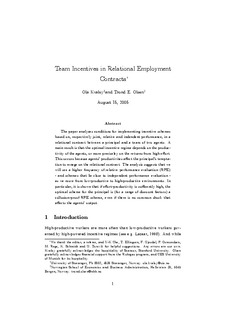| dc.contributor.author | Kvaløy, Ola | |
| dc.contributor.author | Olsen, Trond E. | |
| dc.date.accessioned | 2006-07-10T12:24:05Z | |
| dc.date.available | 2006-07-10T12:24:05Z | |
| dc.date.issued | 2005-08 | |
| dc.identifier.issn | 1500-4066 | |
| dc.identifier.uri | http://hdl.handle.net/11250/163569 | |
| dc.description.abstract | The paper analyzes conditions for implementing incentive schemes based on, respectively joint, relative and independent performance, in a relational contract between a principal and a team of two agents. A main result is that the optimal incentive regime depends on the productivity of the agents, or more precisely on the returns from high effort. This occurs because agents’ productivities affect the principal’s temptation to renege on the relational contract. The analysis suggests that we will see a higher frequency of relative performance evaluation (RPE) - and schemes that lie close to independent performance evaluation - as we move from low-productive to high-productive environments. In particular, it is shown that if effort-productivity is sufficiently high, the optimal scheme for the principal is (for a range of discount factors) a collusion-proof RPE scheme, even if there is no common shock that affects the agents’ output. | en |
| dc.format.extent | 380758 bytes | |
| dc.format.mimetype | application/pdf | |
| dc.language.iso | eng | en |
| dc.publisher | Norwegian School of Economics and Business Administration. Department of Finance and Management Science | en |
| dc.relation.ispartofseries | Discussion paper | en |
| dc.relation.ispartofseries | 2005:7 | en |
| dc.title | Team incentives in relational employment contracts | en |
| dc.type | Working paper | en |
